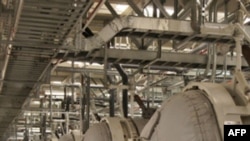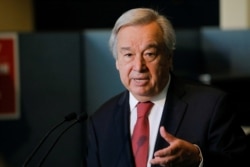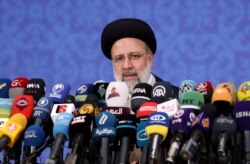The U.N. secretary-general has called on the United States to lift its sanctions on Iran and for both countries to return to the 2015 nuclear deal.
"I appeal to the United States to lift or waive its sanctions outlined in the plan, extend the waivers with regard to the trade in oil with the Islamic Republic of Iran, and fully renew waivers for nuclear non-proliferation projects in the framework of the Plan," Antonio Guterres wrote in a report, which the Security Council discussed on Wednesday.
Guterres said he was encouraged by recent diplomatic efforts to bring the two parties back into full implementation of the deal, known as the Joint Comprehensive Plan of Action — or JCPOA — which has been close to collapsing since former President Donald Trump withdrew the United States in May 2018 and reimposed unilateral sanctions.
In response, Tehran resumed some of its nuclear activities, and in July 2019 it breached the deal by exceeding limits on both uranium enrichment and stockpile levels. Tehran has since gone even further, enriching uranium up to 60% and expanding its stockpile beyond JCPOA allowed limits.
Since April, there have been six rounds of talks in Vienna between Iran and the powers that remain in the deal — Britain, China, France, Germany and Russia — aimed at a return by the U.S. to the nuclear deal. The JCPOA initially gradually lifted international sanctions on Iran in exchange for limits on its nuclear activities.
The Biden administration has said it wants to return to the deal, but the U.S., along with Britain, France and Germany, has warned that the talks cannot drag on indefinitely.
"Time for reaching a decision is fast approaching," Britain's U.N. Ambassador Barbara Woodward said. "We cannot guarantee that the same terms for a deal will be on offer later in the year." She urged Iran's president-elect, Ebrahim Raisi, to set the country "on a different course."
The Western allies also expressed concern Wednesday about Tehran's violations of its nuclear commitments.
"In particular, Iran continues installing and operating numbers and types of centrifuges beyond JCPOA limits; producing quantities and enrichment levels of uranium well beyond the deal's limits, including enrichment up to 60% U-235; and producing uranium metal," said U.S. Deputy U.N. Ambassador Jeffrey DeLaurentis.
Iran has always denied that its nuclear activities are for military purposes, and says steps taken since 2019 are "reversible."
"While we are sincere and serious in current negotiations, our ultimate goal is only to ensure implementation of the deal as is by all — no more, no less," Iran's U.N. ambassador, Majid Takht Ravanchi, told the council.
Russia's and China's envoys said the U.S. must take the lead in returning to the deal without pre-conditions since it is the one that left, stressing the need for all sanctions to be lifted. Then, they said, Iran should also come back into compliance.
"This is the right way to bring the Iranian nuclear deal back on track and achieve de-escalation of the situation in the region," said China's Deputy U.N. Ambassador Geng Shuang.






